外研版(2019) 选择性必修第一册 Unit 1 Laugh out Loud! Developing ideas 课件(34张ppt)
文档属性
| 名称 | 外研版(2019) 选择性必修第一册 Unit 1 Laugh out Loud! Developing ideas 课件(34张ppt) | 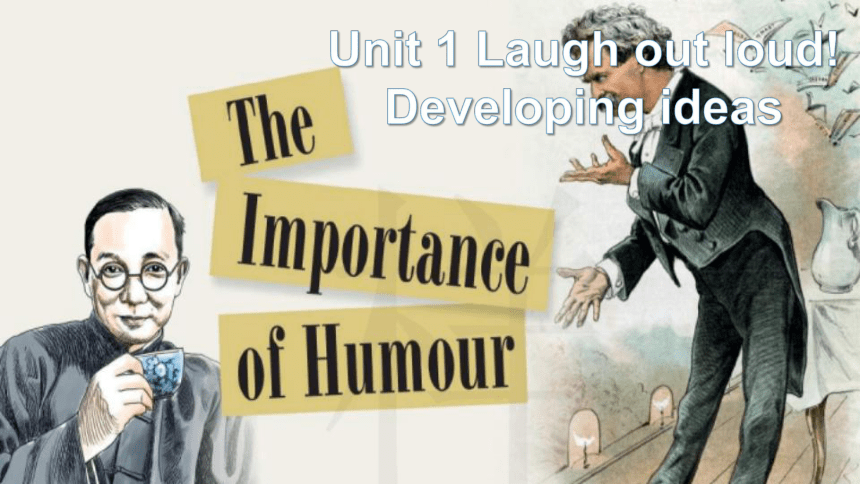 | |
| 格式 | pptx | ||
| 文件大小 | 2.5MB | ||
| 资源类型 | 教案 | ||
| 版本资源 | 外研版(2019) | ||
| 科目 | 英语 | ||
| 更新时间 | 2022-11-27 12:00:41 | ||
图片预览

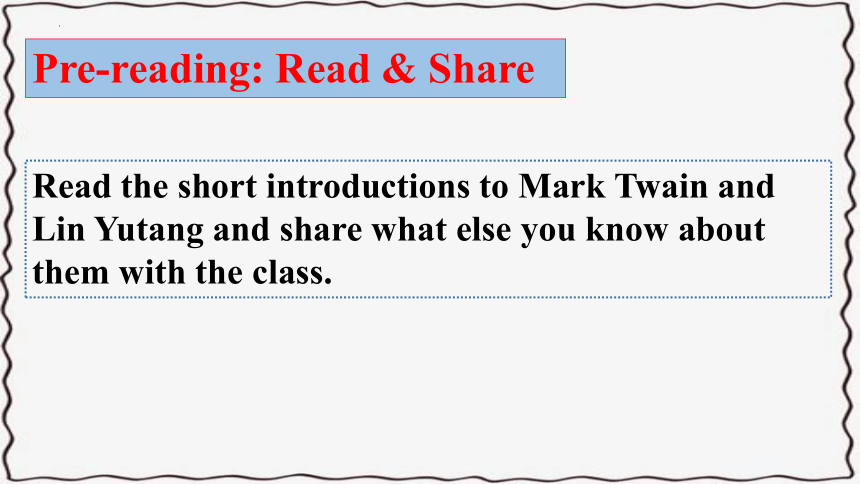
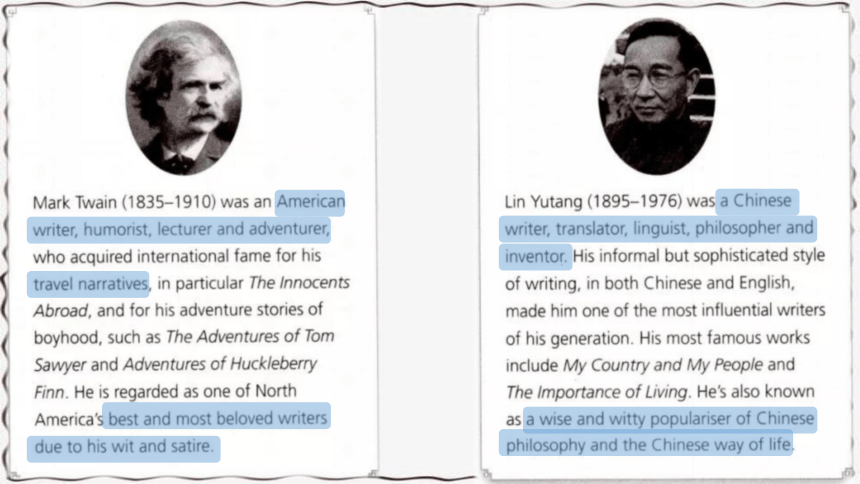
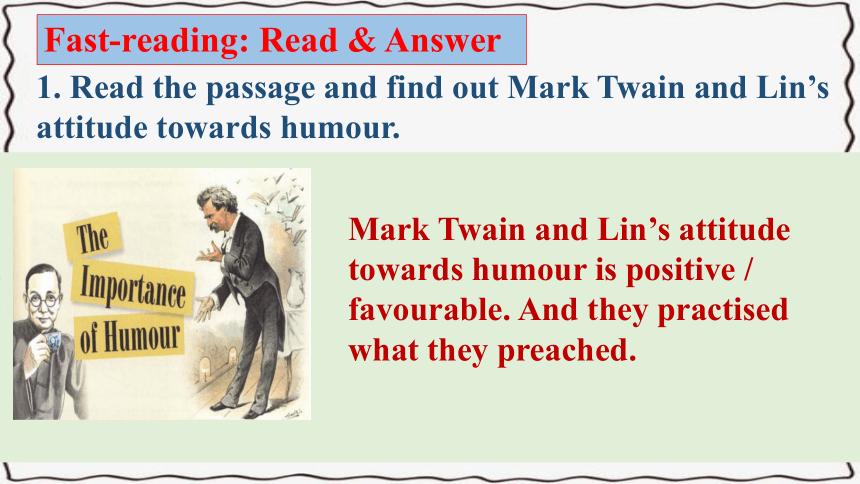
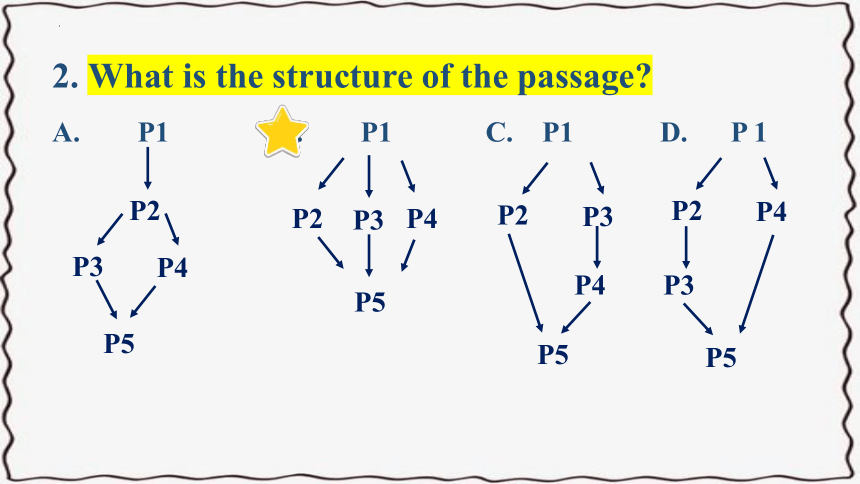
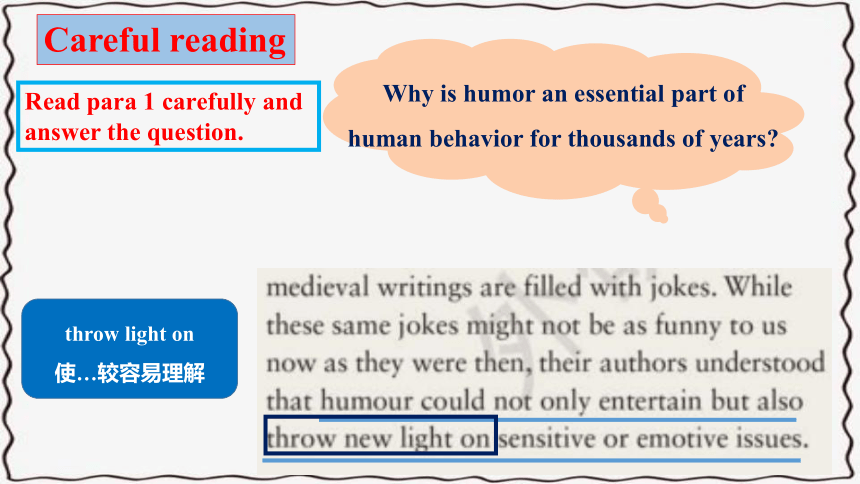
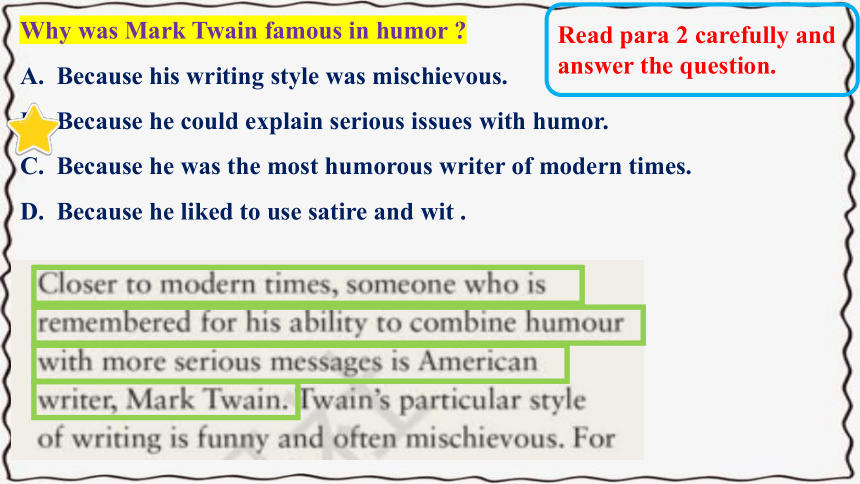
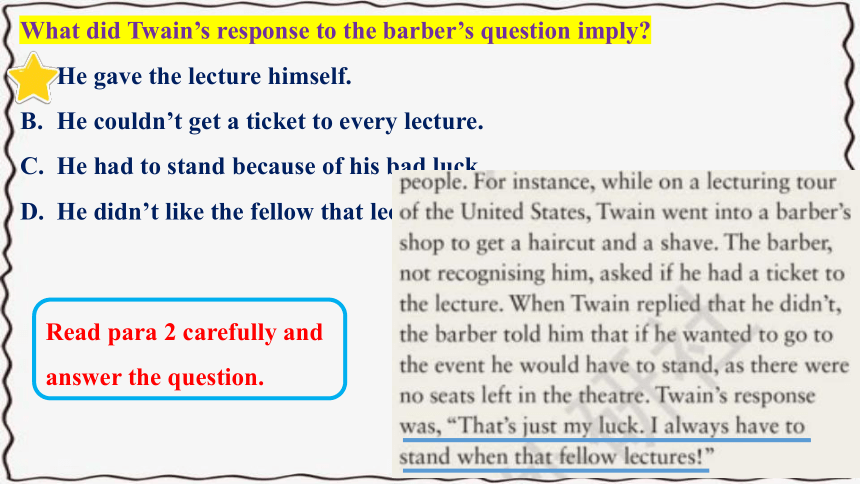
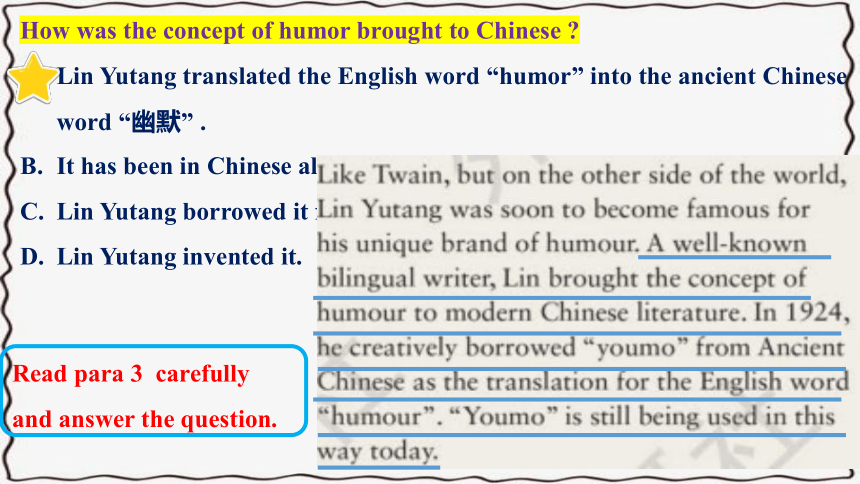
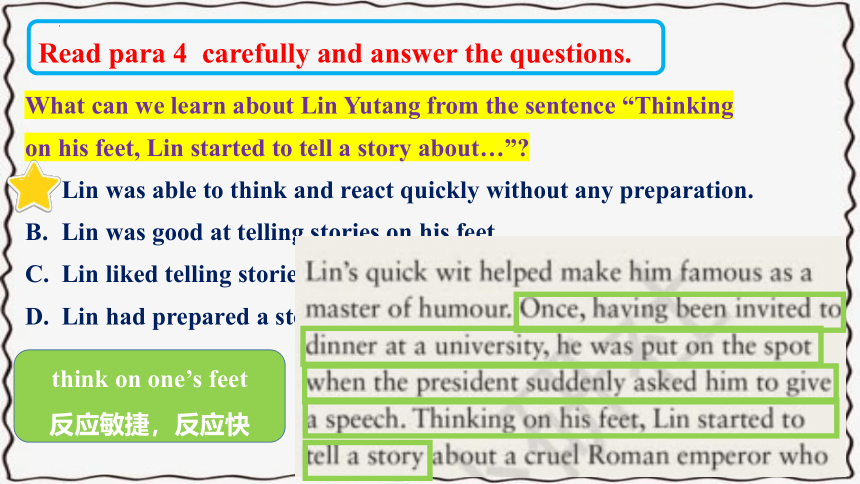
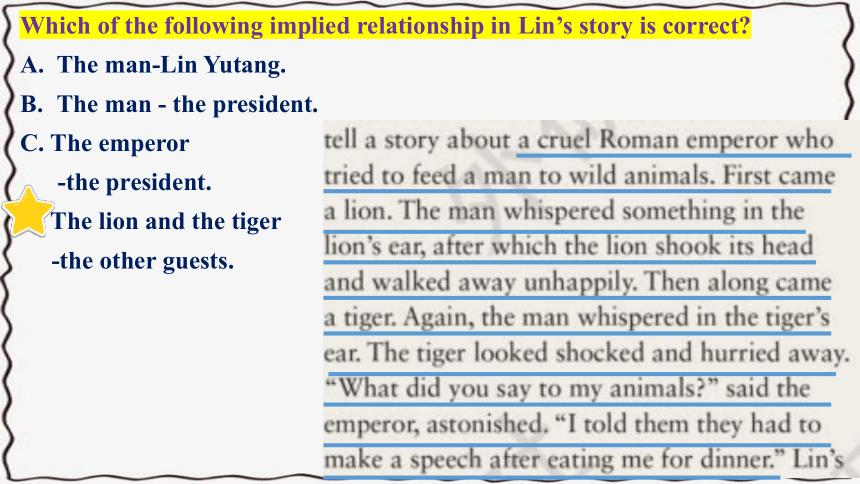
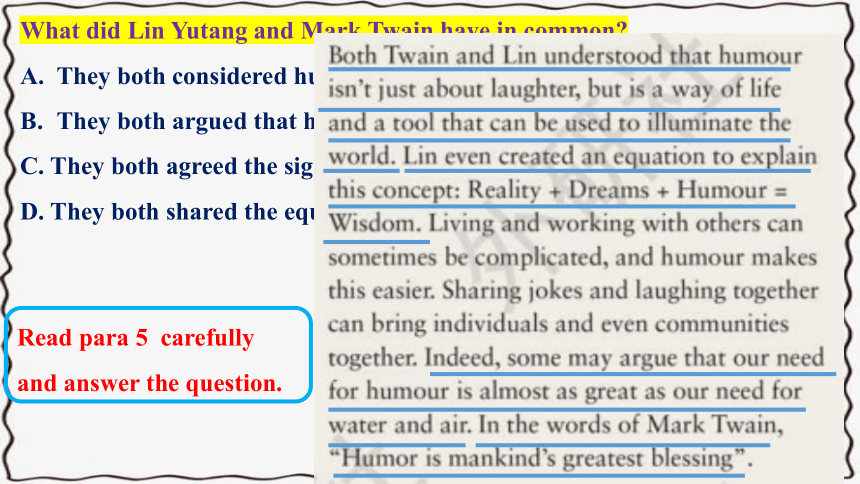
文档简介
(共34张PPT)
Unit 1 Laugh out loud!
Developing ideas
Pre-reading: Read & Share
Read the short introductions to Mark Twain and Lin Yutang and share what else you know about them with the class.
Fast-reading: Read & Answer
Mark Twain and Lin’s attitude towards humour is positive / favourable. And they practised what they preached.
1. Read the passage and find out Mark Twain and Lin’s attitude towards humour.
2. What is the structure of the passage
A. P1 B. P1 C. P1 D. P 1
P2
P3
P4
P5
P2
P3
P4
P5
P2
P3
P4
P5
P2
P4
P3
P5
Read para 1 carefully and answer the question.
Why is humor an essential part of human behavior for thousands of years
throw light on
使…较容易理解
Careful reading
Why was Mark Twain famous in humor
Because his writing style was mischievous.
Because he could explain serious issues with humor.
Because he was the most humorous writer of modern times.
Because he liked to use satire and wit .
Read para 2 carefully and answer the question.
What did Twain’s response to the barber’s question imply
He gave the lecture himself.
He couldn’t get a ticket to every lecture.
He had to stand because of his bad luck
He didn’t like the fellow that lectured.
Read para 2 carefully and answer the question.
How was the concept of humor brought to Chinese
Lin Yutang translated the English word “humor” into the ancient Chinese word “幽默” .
It has been in Chinese all the time.
Lin Yutang borrowed it from western literature.
Lin Yutang invented it.
Read para 3 carefully and answer the question.
What can we learn about Lin Yutang from the sentence “Thinking
on his feet, Lin started to tell a story about…”
Lin was able to think and react quickly without any preparation.
Lin was good at telling stories on his feet.
Lin liked telling stories in his speech.
Lin had prepared a story in advance.
Read para 4 carefully and answer the questions.
think on one’s feet
反应敏捷,反应快
Which of the following implied relationship in Lin’s story is correct
The man-Lin Yutang.
The man - the president.
C. The emperor
-the president.
D. The lion and the tiger
-the other guests.
What did Lin Yutang and Mark Twain have in common
They both considered humor as laughter.
They both argued that humor wasn’t as essential as water for us.
C. They both agreed the significance of humor for human beings.
D. They both shared the equation: Reality + Dreams + Humor = Wisdom.
Read para 5 carefully and answer the question.
What did Lin Yutang and Mark Twain have in common
They both considered humor as laughter.
They both argued that humor wasn’t as essential as water for us.
C. They both agreed the significance of humor for human beings.
D. They both shared the equation: Reality + Dreams + Humor = Wisdom.
What is a punch line
Learning to learn
A punch line concludes a joke and is intended to make people laugh. In broader sense, a punch line can refer to the unexpected and funny conclusion of any performance, situation or story.
Punch line:故事或笑话的最后部分点题或抛出笑料等的)妙语,画龙点睛的结尾句
Organise information from the passage and complete the diagram.
Introduction
Humour is an essential part of 1 _________________ . Authors have used it to 2 ______________, and throw new light on 3 _______________________________.
human behaviour
entertain
sensitive or emotive issues
Post reading
Mark Twain
Remembered for: ability to 4 _________________ with more 5 ___________________
Writing style: 6 ___________________________
Example: 7 ___________________________________
Also well known for his witty remarks
Example: 8 ____________________________________
_____________________________________________
“That’s just my luck. I always have to stand when that fellow lectures!”
The Adventures of Tom Sawyer
funny and often mischievous
serious messages
combine humour
Lin Yutang
Famous for his unique brand of humour
Evidence: 9 _____________________________________
_______________________________________________
Quick wit helped make him famous as 10 ________________
Example: 11 _____________________________________
_______________________________________________
_______________________________________________
He borrowed “youmo” from Ancient Chinese as the translation for the English word “humour” .
a master of humour
He told a story about a cruel Roman emperor who tried to feed a man to wild animals during the dinner at a university.
Conclusion
Humor is a 12_________________and a tool that can be used to 13_____________________.
Lin created an equation :
___________+___________+____________=________
Humor is almost as great as our need for________________.
In the words of Mark Twain:
“_________________________________________”.
way of life
illuminate the world
Reality
Dreams
Humor
wisdom
water and air
Humor is mankind`s greatest blessing
Think & Share
Reality +Dreams +Humour
= Wisdom
林语堂的人生公式
Work in groups. Discuss and present your opinion of the equation from the passage.
Post-reading: Group Work
1. Work out the meaning of this equation. Consider the following:
What is your understanding of “reality” and “dreams”
What is the function of “humour” in this equation
What is your understanding of “wisdom”
Reality + Dreams + Humour = Wisdom
Work in groups. Discuss and present your opinion of the equation from the passage.
Post-reading: Group Work
2. Decide whether you agree with Lin’s definition of wisdom. Think of examples to support your opinion and make notes.
3. Share your opinion with the class.
Reality + Dreams + Humour = Wisdom
Language points——词汇
conclude v.(使)结束,终止
情境探究
①Let me conclude my speech with a saying:Where there is a will,there is a way.
让我用一句谚语结束我的演讲:有志者,事竟成。
②In conclusion,I think there is hope for the future.
总之,我认为将来还有希望。
③We can safely draw a conclusion from our discussion.
从讨论中我们可以有把握地得出结论。
归纳拓展
(1)conclude(...)with...以……结束(……)
(2)conclusion n.结论
in conclusion 最后,总之
arrive at/come to/draw/reach a conclusion得出结论
work out 计算,算出;理解,了解;解决;证明有效或实用;进展(顺利);锻炼
情境探究
①The deal isn't just working out the way we were promised.
这项交易并不如承诺我们的那样进展顺利。
②My friend works for a newspaper.
我的朋友为一家报社工作。
③She is a trained teacher, but she works as a secretary in our office.
她是个训练有素的教师,却在我们办公室里当起了秘书。
归纳拓展
work for 效劳;为……效力
work as充当,担任;以……身份工作
头脑风暴
你还知道哪些表达“充当,担任”的动词词组 请查阅资料,并写出来。
答案:act as/serve as/function as
keep up 跟上,赶上;使不下降;继续,使继续下去;(精神、勇气、情绪、体力、决心等)保持愉快、活泼、开朗
①If this storm keeps up, the crops will be destroyed.
这场风暴要是持续不停,庄稼就要被毁了。
②We should keep away from cigarettes and keep healthy.
我们应该远离香烟,保持健康。
③Mary tends to keep off from people who try to be friendly too suddenly.玛丽一般不去接近那些突然变得亲热起来的人。
④Keep in mind that we shall have to be present before eight tomorrow.记住我们要在明天8点以前到场。
归纳拓展
keep away from远离……
keep up with 赶上,跟上
keep off 避开,不接近
keep...in mind/keep in mind that 记住
keep in touch with与……保持联系
句型公式 while引导让步状语从句;not only...but also...句式
教材原句 While these same jokes might not be as funny to us now as they were then, their authors understood that humour could not only entertain but also throw new light on sensitive or emotive issues.
尝试翻译 虽然那些同样的笑话对现在的我们来说可能不像当时那么有趣,但是它们的作者明白,幽默不仅使大众快乐,而且可以使人们对敏感或有争议的问题产生新的认识。
Language points——句型公式
句型公式 “(not+)现在分词”作原因状语
教材原句 The barber, not recognising him, asked if he had a ticket to the lecture.
尝试翻译 理发师没有认出他来,问他有没有这场演讲的门票。
句型公式 having (been) done作状语
教材原句 Once, having been invited to dinner at a university, he was put on the spot when the president suddenly asked him to give a speech.
尝试翻译 有一次,他被邀请去一所大学吃晚饭,当校长突然让讲话时,他感到很为难。
句型公式 全部倒装句型
教材原句 Then along came a tiger.
尝试翻译 然后来了一只老虎。
句型公式 形容词(短语)作状语
教材原句 “What did you say to my animals ” said the emperor, astonished.
尝试翻译 “你对我的动物们说了什么 ”皇帝惊讶地说道。
Language points——难句突破
[自我分析]本句是一个主从复合句。Thinking on his feet是现在分词短语,在句中作 状语;Lin started to tell a story about a cruel Roman emperor是主句,who tried to feed a man to wild animals为 限制性定语从句,修饰先行词emperor。
[尝试翻译] 林语堂急中生智,开始讲述一个残忍的罗马皇帝试图把一个人喂给野兽的故事。
[自我分析]本句是一个主从复合句。because he knew how to use his body and facial features to make people laugh是由because引导的 原因状语从句,其中how to use his body and facial features to make people laugh在从句中作 knew的宾语。
[尝试翻译] 查理·卓别林是他那个时代最优秀的喜剧演员之一,因为他知道如何利用自己的身体和面部特征来逗人发笑。
[自我分析]本句是一个主从复合句。because he knew how to use his body and facial features to make people laugh是由because引导的 原因状语从句,其中how to use his body and facial features to make people laugh在从句中作 knew的宾语。
[尝试翻译] 查理·卓别林是他那个时代最优秀的喜剧演员之一,因为他知道如何利用自己的身体和面部特征来逗人发笑。
Practice:完成句子
1.许多运动员认为乒乓球不仅是一项体能比赛,还是一场心理比赛。(not only...but also...)
Many players believe table tennis is not only a physical game but also a psychological game.
2.不知道要做什么,他向他的好朋友求助。(现在分词作状语)
Not knowing what to do, he asked his good friend for help.
3.在北京旅游时,我参观了鸟巢。(while doing)
While travelling in Beijing, I paid a visit to the Bird's Nest.
4.路边站着很多人。(完全倒装)
On the roadside stood a lot of people.
5.他在风雪中度过了七天,又冷又饿。(形容词短语作状语)
He spent seven days in the wind and snow, cold and hungry.
Homework
Think about your opinion of the equation “Reality + Dreams + Humour = Wisdom”, and write it down.
Unit 1 Laugh out loud!
Developing ideas
Pre-reading: Read & Share
Read the short introductions to Mark Twain and Lin Yutang and share what else you know about them with the class.
Fast-reading: Read & Answer
Mark Twain and Lin’s attitude towards humour is positive / favourable. And they practised what they preached.
1. Read the passage and find out Mark Twain and Lin’s attitude towards humour.
2. What is the structure of the passage
A. P1 B. P1 C. P1 D. P 1
P2
P3
P4
P5
P2
P3
P4
P5
P2
P3
P4
P5
P2
P4
P3
P5
Read para 1 carefully and answer the question.
Why is humor an essential part of human behavior for thousands of years
throw light on
使…较容易理解
Careful reading
Why was Mark Twain famous in humor
Because his writing style was mischievous.
Because he could explain serious issues with humor.
Because he was the most humorous writer of modern times.
Because he liked to use satire and wit .
Read para 2 carefully and answer the question.
What did Twain’s response to the barber’s question imply
He gave the lecture himself.
He couldn’t get a ticket to every lecture.
He had to stand because of his bad luck
He didn’t like the fellow that lectured.
Read para 2 carefully and answer the question.
How was the concept of humor brought to Chinese
Lin Yutang translated the English word “humor” into the ancient Chinese word “幽默” .
It has been in Chinese all the time.
Lin Yutang borrowed it from western literature.
Lin Yutang invented it.
Read para 3 carefully and answer the question.
What can we learn about Lin Yutang from the sentence “Thinking
on his feet, Lin started to tell a story about…”
Lin was able to think and react quickly without any preparation.
Lin was good at telling stories on his feet.
Lin liked telling stories in his speech.
Lin had prepared a story in advance.
Read para 4 carefully and answer the questions.
think on one’s feet
反应敏捷,反应快
Which of the following implied relationship in Lin’s story is correct
The man-Lin Yutang.
The man - the president.
C. The emperor
-the president.
D. The lion and the tiger
-the other guests.
What did Lin Yutang and Mark Twain have in common
They both considered humor as laughter.
They both argued that humor wasn’t as essential as water for us.
C. They both agreed the significance of humor for human beings.
D. They both shared the equation: Reality + Dreams + Humor = Wisdom.
Read para 5 carefully and answer the question.
What did Lin Yutang and Mark Twain have in common
They both considered humor as laughter.
They both argued that humor wasn’t as essential as water for us.
C. They both agreed the significance of humor for human beings.
D. They both shared the equation: Reality + Dreams + Humor = Wisdom.
What is a punch line
Learning to learn
A punch line concludes a joke and is intended to make people laugh. In broader sense, a punch line can refer to the unexpected and funny conclusion of any performance, situation or story.
Punch line:故事或笑话的最后部分点题或抛出笑料等的)妙语,画龙点睛的结尾句
Organise information from the passage and complete the diagram.
Introduction
Humour is an essential part of 1 _________________ . Authors have used it to 2 ______________, and throw new light on 3 _______________________________.
human behaviour
entertain
sensitive or emotive issues
Post reading
Mark Twain
Remembered for: ability to 4 _________________ with more 5 ___________________
Writing style: 6 ___________________________
Example: 7 ___________________________________
Also well known for his witty remarks
Example: 8 ____________________________________
_____________________________________________
“That’s just my luck. I always have to stand when that fellow lectures!”
The Adventures of Tom Sawyer
funny and often mischievous
serious messages
combine humour
Lin Yutang
Famous for his unique brand of humour
Evidence: 9 _____________________________________
_______________________________________________
Quick wit helped make him famous as 10 ________________
Example: 11 _____________________________________
_______________________________________________
_______________________________________________
He borrowed “youmo” from Ancient Chinese as the translation for the English word “humour” .
a master of humour
He told a story about a cruel Roman emperor who tried to feed a man to wild animals during the dinner at a university.
Conclusion
Humor is a 12_________________and a tool that can be used to 13_____________________.
Lin created an equation :
___________+___________+____________=________
Humor is almost as great as our need for________________.
In the words of Mark Twain:
“_________________________________________”.
way of life
illuminate the world
Reality
Dreams
Humor
wisdom
water and air
Humor is mankind`s greatest blessing
Think & Share
Reality +Dreams +Humour
= Wisdom
林语堂的人生公式
Work in groups. Discuss and present your opinion of the equation from the passage.
Post-reading: Group Work
1. Work out the meaning of this equation. Consider the following:
What is your understanding of “reality” and “dreams”
What is the function of “humour” in this equation
What is your understanding of “wisdom”
Reality + Dreams + Humour = Wisdom
Work in groups. Discuss and present your opinion of the equation from the passage.
Post-reading: Group Work
2. Decide whether you agree with Lin’s definition of wisdom. Think of examples to support your opinion and make notes.
3. Share your opinion with the class.
Reality + Dreams + Humour = Wisdom
Language points——词汇
conclude v.(使)结束,终止
情境探究
①Let me conclude my speech with a saying:Where there is a will,there is a way.
让我用一句谚语结束我的演讲:有志者,事竟成。
②In conclusion,I think there is hope for the future.
总之,我认为将来还有希望。
③We can safely draw a conclusion from our discussion.
从讨论中我们可以有把握地得出结论。
归纳拓展
(1)conclude(...)with...以……结束(……)
(2)conclusion n.结论
in conclusion 最后,总之
arrive at/come to/draw/reach a conclusion得出结论
work out 计算,算出;理解,了解;解决;证明有效或实用;进展(顺利);锻炼
情境探究
①The deal isn't just working out the way we were promised.
这项交易并不如承诺我们的那样进展顺利。
②My friend works for a newspaper.
我的朋友为一家报社工作。
③She is a trained teacher, but she works as a secretary in our office.
她是个训练有素的教师,却在我们办公室里当起了秘书。
归纳拓展
work for 效劳;为……效力
work as充当,担任;以……身份工作
头脑风暴
你还知道哪些表达“充当,担任”的动词词组 请查阅资料,并写出来。
答案:act as/serve as/function as
keep up 跟上,赶上;使不下降;继续,使继续下去;(精神、勇气、情绪、体力、决心等)保持愉快、活泼、开朗
①If this storm keeps up, the crops will be destroyed.
这场风暴要是持续不停,庄稼就要被毁了。
②We should keep away from cigarettes and keep healthy.
我们应该远离香烟,保持健康。
③Mary tends to keep off from people who try to be friendly too suddenly.玛丽一般不去接近那些突然变得亲热起来的人。
④Keep in mind that we shall have to be present before eight tomorrow.记住我们要在明天8点以前到场。
归纳拓展
keep away from远离……
keep up with 赶上,跟上
keep off 避开,不接近
keep...in mind/keep in mind that 记住
keep in touch with与……保持联系
句型公式 while引导让步状语从句;not only...but also...句式
教材原句 While these same jokes might not be as funny to us now as they were then, their authors understood that humour could not only entertain but also throw new light on sensitive or emotive issues.
尝试翻译 虽然那些同样的笑话对现在的我们来说可能不像当时那么有趣,但是它们的作者明白,幽默不仅使大众快乐,而且可以使人们对敏感或有争议的问题产生新的认识。
Language points——句型公式
句型公式 “(not+)现在分词”作原因状语
教材原句 The barber, not recognising him, asked if he had a ticket to the lecture.
尝试翻译 理发师没有认出他来,问他有没有这场演讲的门票。
句型公式 having (been) done作状语
教材原句 Once, having been invited to dinner at a university, he was put on the spot when the president suddenly asked him to give a speech.
尝试翻译 有一次,他被邀请去一所大学吃晚饭,当校长突然让讲话时,他感到很为难。
句型公式 全部倒装句型
教材原句 Then along came a tiger.
尝试翻译 然后来了一只老虎。
句型公式 形容词(短语)作状语
教材原句 “What did you say to my animals ” said the emperor, astonished.
尝试翻译 “你对我的动物们说了什么 ”皇帝惊讶地说道。
Language points——难句突破
[自我分析]本句是一个主从复合句。Thinking on his feet是现在分词短语,在句中作 状语;Lin started to tell a story about a cruel Roman emperor是主句,who tried to feed a man to wild animals为 限制性定语从句,修饰先行词emperor。
[尝试翻译] 林语堂急中生智,开始讲述一个残忍的罗马皇帝试图把一个人喂给野兽的故事。
[自我分析]本句是一个主从复合句。because he knew how to use his body and facial features to make people laugh是由because引导的 原因状语从句,其中how to use his body and facial features to make people laugh在从句中作 knew的宾语。
[尝试翻译] 查理·卓别林是他那个时代最优秀的喜剧演员之一,因为他知道如何利用自己的身体和面部特征来逗人发笑。
[自我分析]本句是一个主从复合句。because he knew how to use his body and facial features to make people laugh是由because引导的 原因状语从句,其中how to use his body and facial features to make people laugh在从句中作 knew的宾语。
[尝试翻译] 查理·卓别林是他那个时代最优秀的喜剧演员之一,因为他知道如何利用自己的身体和面部特征来逗人发笑。
Practice:完成句子
1.许多运动员认为乒乓球不仅是一项体能比赛,还是一场心理比赛。(not only...but also...)
Many players believe table tennis is not only a physical game but also a psychological game.
2.不知道要做什么,他向他的好朋友求助。(现在分词作状语)
Not knowing what to do, he asked his good friend for help.
3.在北京旅游时,我参观了鸟巢。(while doing)
While travelling in Beijing, I paid a visit to the Bird's Nest.
4.路边站着很多人。(完全倒装)
On the roadside stood a lot of people.
5.他在风雪中度过了七天,又冷又饿。(形容词短语作状语)
He spent seven days in the wind and snow, cold and hungry.
Homework
Think about your opinion of the equation “Reality + Dreams + Humour = Wisdom”, and write it down.
